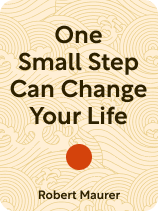

This article is an excerpt from the Shortform book guide to "One Small Step Can Change Your Life" by Robert Maurer. Shortform has the world's best summaries and analyses of books you should be reading.
Like this article? Sign up for a free trial here.
Are you tired of feeling overwhelmed by change? Do you want to know how to deactivate fight-or-flight responses that hold you back?
Change doesn’t have to be scary. Clinical psychologist Robert Maurer writes that, by taking small, incremental steps, you can bypass your brain’s alarm system and embrace new possibilities with ease. This approach not only reduces fear but also helps build momentum and establish new behaviors.
Keep reading to discover how tiny actions can lead to big transformations in your life.
Deactivate Your Fight-or-Flight Response
Does your inevitable fight-or-flight response to change mean that you’re forever bound to suffer from cognitive resistance and fear when attempting change? Fortunately, this doesn’t have to be the case. Maurer shows how to deactivate fight-or-flight responses and embrace change with confidence and ease: Take very small, incremental actions toward your goals.
Taking small, easy actions enables you to sneak past your internal alarm system, preventing your fight-or-flight response from kicking in. This allows the parts of your brain responsible for conscious thought and problem-solving to stay active and engaged and diminishes the fear that typically accompanies the process of change.
(Shortform note: BJ Fogg (Tiny Habits) suggests that small actions bypass your fight-or-flight response because they’re psychologically safe. He explains that small actions are easy to achieve and carry a low risk, significantly reducing the fear associated with change. Additionally, their minuscule nature means you can keep your efforts private, enabling you to change your behaviors without worrying about external judgments or expectations.)
Beyond these immediate benefits, Maurer says that this incremental approach supports your ability to implement change by helping you build momentum and establish new behaviors.
Build momentum: While small actions may seem inconsequential, their impact lies in their cumulative effect. Because they’re so easy to achieve, they pave the way for further actions that keep you moving toward larger achievements. For example, perhaps you want to be more organized. Decluttering one drawer feels so easy and satisfying that you decide to tackle your closet, gradually building the momentum to organize your entire house.
(Shortform note: According to Chip and Dan Heath (Switch), small actions also help you build momentum by increasing your self-confidence. Contemplating a large, distant change from your starting point can discourage you: “I’ll never be able to organize my house. It’s such a mess.” On the other hand, small, frequent actions ensure that you’re only looking at the next step instead of impossibly far ahead. Each time you accomplish a small action, you become more confident you’ll take the next one: “I’ve cleared one drawer every day this week. It’ll be no problem to tackle the closet next week.”)
Establish new behaviors: With each small action, you gently reduce your resistance to new ways of thinking and behaving. Over time, these new thoughts and behaviors become second nature, replacing old patterns with minimal friction. For example, let’s say you want to cut out unhealthy beverages. Introducing one glass of water into your morning routine soon feels so natural and beneficial that you automatically start choosing water over sugary drinks throughout the day.
Maurer argues that these benefits lead to a profound shift in how you experience change: What once felt daunting to you becomes enjoyable and achievable, and you feel empowered to progress toward your goals.
(Shortform note: In Atomic Habits, James Clear uses the concept of identity to clarify how regularly taking small actions helps establish new behaviors. He notes that your actions reinforce your identity and vice versa. So, the more you act in a certain way, the more you start to believe that’s who you are. For example, if you act as if you already live a healthy lifestyle (by opting for water over soda), your actions will make you naturally start feeling like a healthy person. This identity will motivate you to make nutritious choices throughout your day because you’re a healthy person and that’s what healthy people do.)

———End of Preview———
Like what you just read? Read the rest of the world's best book summary and analysis of Robert Maurer's "One Small Step Can Change Your Life" at Shortform.
Here's what you'll find in our full One Small Step Can Change Your Life summary:
- Why it's often difficult to make the changes you want
- How to avoid your fight-or-flight response and move forward instead
- Simple strategies to transform seemingly daunting goals into enjoyable and attainable ones






